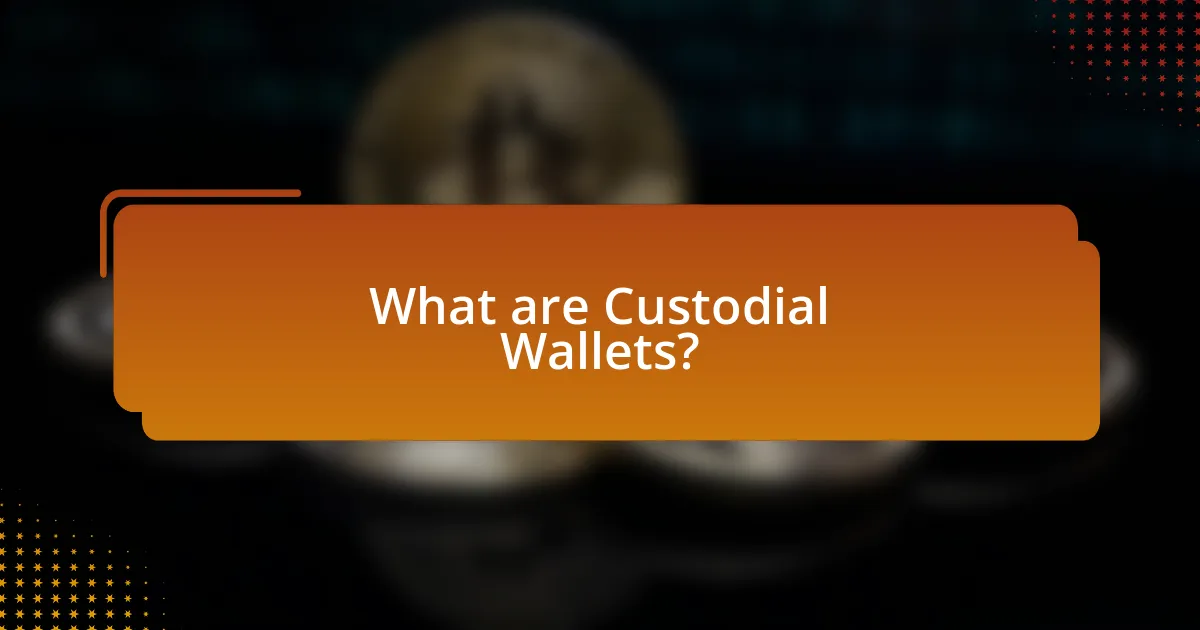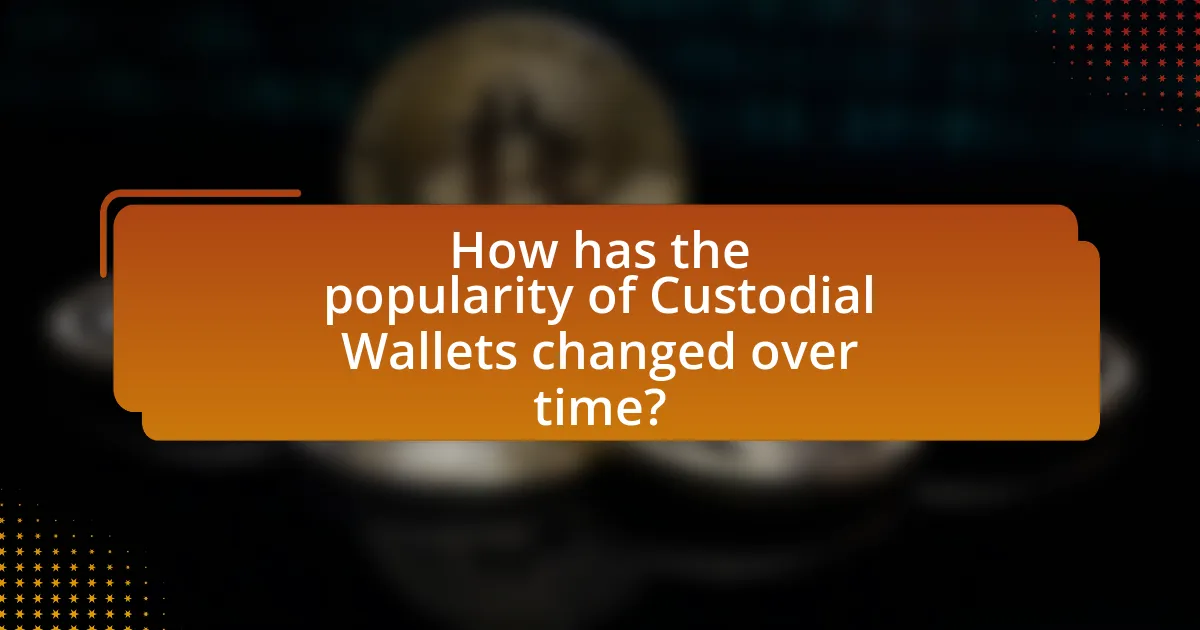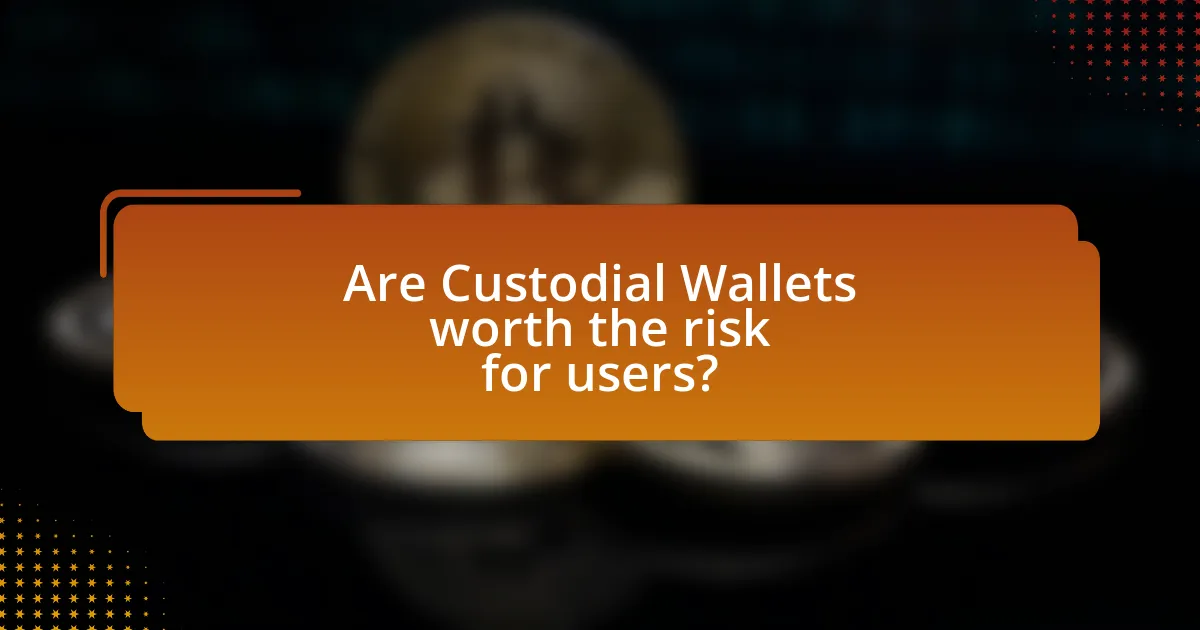Custodial wallets are digital wallets managed by third-party service providers, such as cryptocurrency exchanges, which hold and secure users’ private keys. This article examines the significant role custodial wallets play in the cryptocurrency ecosystem, accounting for approximately 70% of all transactions in 2021. It contrasts custodial wallets with non-custodial options, highlighting their convenience, user-friendly features, and associated risks, including security vulnerabilities and loss of control over assets. Additionally, the article discusses the implications of regulatory compliance, the impact of security breaches, and best practices for users considering custodial wallets, ultimately evaluating whether the benefits outweigh the risks.

What are Custodial Wallets?
Custodial wallets are digital wallets where a third party, typically a cryptocurrency exchange or service provider, holds and manages the private keys on behalf of the user. This means that users do not have direct control over their cryptocurrencies, as the custodian is responsible for the security and management of the assets. According to a report by Chainalysis, custodial wallets accounted for approximately 70% of all cryptocurrency transactions in 2021, highlighting their significant role in the crypto ecosystem.
How do Custodial Wallets differ from Non-Custodial Wallets?
Custodial wallets differ from non-custodial wallets primarily in terms of control over private keys. In custodial wallets, a third party manages the private keys on behalf of the user, meaning the user does not have direct control over their funds. Conversely, non-custodial wallets allow users to retain full control of their private keys, providing them with complete ownership of their cryptocurrency. This distinction is crucial because it affects the security and accessibility of the funds; custodial wallets may offer convenience and ease of use, but they also introduce risks related to trust in the third party, while non-custodial wallets empower users with autonomy and responsibility for their assets.
What are the key features of Custodial Wallets?
Custodial wallets are digital wallets where a third party manages the private keys on behalf of the user. Key features include user-friendly interfaces that simplify cryptocurrency transactions, enhanced security measures such as multi-signature authentication and cold storage, and customer support services that assist users with issues. Additionally, custodial wallets often provide seamless integration with exchanges, allowing for easy trading and conversion of cryptocurrencies. These features make custodial wallets appealing for beginners and those seeking convenience in managing their digital assets.
Why do users choose Custodial Wallets over Non-Custodial options?
Users choose custodial wallets over non-custodial options primarily for convenience and ease of use. Custodial wallets manage private keys on behalf of users, simplifying the process of accessing and managing cryptocurrencies without requiring technical knowledge. This is particularly appealing to newcomers who may find the responsibility of securing their own keys daunting. Additionally, custodial wallets often provide enhanced customer support and recovery options, which can be crucial for users who may forget passwords or lose access to their accounts. According to a survey by Statista, 40% of cryptocurrency users prefer custodial services for their user-friendly interfaces and integrated features, highlighting the demand for accessible solutions in the crypto space.
What are the potential risks associated with Custodial Wallets?
Custodial wallets pose several potential risks, primarily centered around security and control. Users of custodial wallets entrust their private keys to a third-party service, which can lead to vulnerabilities such as hacking incidents, where attackers target the service to steal funds. For instance, in 2020, the KuCoin exchange suffered a hack that resulted in the loss of over $280 million in cryptocurrencies, highlighting the risks associated with custodial services. Additionally, custodial wallets can be subject to regulatory actions, where authorities may freeze accounts or seize assets, further compromising user access to their funds. These risks underscore the importance of understanding the implications of using custodial wallets in the cryptocurrency ecosystem.
How can security breaches impact users of Custodial Wallets?
Security breaches can lead to significant financial losses for users of custodial wallets, as these breaches often result in unauthorized access to users’ funds. When a custodial wallet provider is compromised, hackers can steal private keys or access user accounts, allowing them to transfer or withdraw assets without consent. For instance, the 2014 Mt. Gox hack resulted in the loss of approximately 850,000 Bitcoins, highlighting the vulnerability of custodial wallets to security threats. Additionally, users may face identity theft or loss of personal information, further exacerbating the impact of such breaches.
What are the implications of losing access to a Custodial Wallet?
Losing access to a custodial wallet results in the permanent loss of all assets stored within that wallet. Custodial wallets, managed by third-party services, do not provide users with private keys; therefore, if access is lost—due to forgotten credentials, service shutdown, or hacking—users cannot recover their funds. According to a report by Chainalysis, over $4 billion in cryptocurrency was lost in 2020 due to inaccessible wallets, highlighting the significant risk associated with custodial wallet reliance.
What benefits do Custodial Wallets provide?
Custodial wallets provide enhanced security and user convenience for cryptocurrency management. These wallets are managed by third-party services that take responsibility for safeguarding users’ private keys, reducing the risk of loss due to user error or hacking. Additionally, custodial wallets often offer features such as easy access to funds, user-friendly interfaces, and integrated trading options, making them suitable for beginners and those who prefer a simplified experience. According to a report by Chainalysis, custodial wallets accounted for over 70% of all cryptocurrency transactions in 2021, highlighting their popularity and trust among users.
How do Custodial Wallets enhance user experience for beginners?
Custodial wallets enhance user experience for beginners by simplifying the management of cryptocurrencies through user-friendly interfaces and reduced technical barriers. These wallets handle private key storage and security, allowing users to focus on transactions without needing extensive knowledge of blockchain technology. For instance, platforms like Coinbase and Binance provide intuitive designs and customer support, which help new users navigate the complexities of cryptocurrency trading. Additionally, custodial wallets often offer features such as instant transactions and integrated exchanges, making it easier for beginners to buy, sell, and manage their assets efficiently.
What services do Custodial Wallets typically offer?
Custodial wallets typically offer services such as secure storage of cryptocurrencies, transaction facilitation, and user-friendly interfaces for managing digital assets. These wallets manage private keys on behalf of users, providing a layer of security against loss or theft. Additionally, custodial wallets often include features like customer support, integration with exchanges for easy trading, and backup solutions to recover funds in case of account issues. The prevalence of custodial wallets is evidenced by their widespread use among platforms like Coinbase and Binance, which serve millions of users by simplifying access to cryptocurrency markets.

How has the popularity of Custodial Wallets changed over time?
The popularity of custodial wallets has significantly increased over time, particularly during the cryptocurrency market’s growth phases. As more users entered the crypto space, the convenience and user-friendly nature of custodial wallets attracted individuals who preferred not to manage private keys themselves. For instance, data from a 2021 report by Chainalysis indicated that custodial wallets accounted for over 70% of all cryptocurrency transactions, reflecting a marked rise in their adoption compared to previous years. This trend has been driven by the increasing demand for accessibility and security among new users, as well as the expansion of services offered by exchanges and financial institutions that provide custodial wallet solutions.
What factors have contributed to the rise of Custodial Wallets?
The rise of custodial wallets can be attributed to increased user convenience, enhanced security measures, and the growing adoption of cryptocurrencies. User convenience is a significant factor, as custodial wallets simplify the process of managing digital assets by handling private keys and transactions on behalf of users. Enhanced security measures, such as multi-signature authentication and insurance against hacks, provide users with a sense of safety that self-custody options may lack. Additionally, the growing adoption of cryptocurrencies, evidenced by a surge in retail and institutional interest, has led to a demand for user-friendly solutions that custodial wallets offer, making them more appealing to a broader audience.
How has the growth of cryptocurrency influenced Custodial Wallet adoption?
The growth of cryptocurrency has significantly influenced custodial wallet adoption by increasing user demand for secure and user-friendly storage solutions. As the cryptocurrency market expanded, more individuals sought ways to manage their digital assets safely, leading to a rise in custodial wallets that offer convenience and security features. For instance, a report by Chainalysis in 2021 indicated that custodial wallets accounted for over 70% of all cryptocurrency transactions, reflecting their popularity among users who prefer not to manage private keys themselves. This trend demonstrates that as cryptocurrency adoption grows, so does the reliance on custodial wallets for ease of access and enhanced security.
What role do exchanges play in the popularity of Custodial Wallets?
Exchanges significantly contribute to the popularity of custodial wallets by providing users with a convenient and user-friendly way to manage their cryptocurrencies. These platforms often offer custodial wallets as part of their services, allowing users to store their digital assets securely without needing to manage private keys themselves. According to a report by Chainalysis, over 75% of cryptocurrency transactions occur on exchanges, highlighting their central role in the ecosystem. This high transaction volume indicates that many users prefer the ease of use and accessibility that custodial wallets provide, especially for newcomers to the cryptocurrency space.
What are the regulatory considerations for Custodial Wallets?
Regulatory considerations for custodial wallets include compliance with anti-money laundering (AML) and know your customer (KYC) regulations. Custodial wallet providers must implement robust identity verification processes to prevent illicit activities, as mandated by various jurisdictions. For instance, in the United States, the Financial Crimes Enforcement Network (FinCEN) requires these entities to register as money services businesses (MSBs) and adhere to strict reporting obligations. Additionally, custodial wallets may be subject to data protection laws, such as the General Data Protection Regulation (GDPR) in Europe, which governs the handling of personal information. These regulations ensure that custodial wallet providers maintain transparency and security in their operations, thereby protecting users and the financial system.
How do regulations impact the operation of Custodial Wallets?
Regulations significantly impact the operation of custodial wallets by imposing compliance requirements that custodians must adhere to, such as Know Your Customer (KYC) and Anti-Money Laundering (AML) laws. These regulations require custodial wallet providers to verify the identities of their users and monitor transactions for suspicious activity, which can lead to increased operational costs and complexity. For instance, in the European Union, the Fifth Anti-Money Laundering Directive mandates that cryptocurrency exchanges and wallet providers register with national authorities, affecting how they manage user data and conduct business. Compliance with these regulations can enhance user trust but may also limit the accessibility and anonymity that some users seek in cryptocurrency transactions.
What should users know about compliance and Custodial Wallets?
Users should know that custodial wallets are subject to regulatory compliance requirements, which vary by jurisdiction. These wallets, managed by third-party services, must adhere to anti-money laundering (AML) and know your customer (KYC) regulations to prevent illicit activities. For instance, in the United States, custodial wallet providers are often required to register as money services businesses (MSBs) and implement robust compliance programs. This regulatory oversight can enhance user security but may also lead to privacy concerns, as users’ personal information is collected and stored by the service providers.

Are Custodial Wallets worth the risk for users?
Custodial wallets are generally considered to be worth the risk for users who prioritize convenience and ease of access over complete control of their assets. These wallets, managed by third-party services, offer user-friendly interfaces and often provide additional features like customer support and recovery options. However, the trade-off is that users must trust these services to secure their private keys, which can expose them to risks such as hacking or mismanagement. For instance, in 2021, the cryptocurrency exchange BitMart suffered a significant hack, resulting in the loss of $196 million in assets, highlighting the vulnerabilities associated with custodial wallets. Therefore, while custodial wallets can be beneficial for novice users or those seeking simplicity, the inherent risks necessitate careful consideration.
What should users consider before choosing a Custodial Wallet?
Users should consider security, control, fees, and reputation before choosing a custodial wallet. Security is paramount, as custodial wallets store private keys on behalf of users, making them vulnerable to hacks; for instance, the 2014 Mt. Gox hack resulted in the loss of 850,000 Bitcoins. Control is another critical factor, as users do not have direct access to their funds, which can lead to issues if the service provider faces operational problems. Fees can vary significantly among custodial wallets, impacting the overall cost of transactions and withdrawals. Lastly, the reputation of the wallet provider is essential; users should research the provider’s history and user reviews to ensure reliability and trustworthiness.
How can users assess the security of a Custodial Wallet?
Users can assess the security of a custodial wallet by evaluating the wallet provider’s security measures, regulatory compliance, and user reviews. Key factors include the implementation of two-factor authentication, encryption protocols, and insurance policies against theft or loss. For instance, reputable custodial wallets often disclose their security audits and compliance with regulations such as the Financial Action Task Force (FATF) guidelines. Additionally, analyzing user feedback on platforms like Trustpilot or Reddit can provide insights into the wallet’s reliability and past security incidents.
What are the best practices for using Custodial Wallets safely?
To use custodial wallets safely, users should enable two-factor authentication (2FA) to add an extra layer of security. This practice significantly reduces the risk of unauthorized access, as it requires a second form of verification beyond just a password. Additionally, users should regularly update their passwords and use strong, unique passwords to protect their accounts. According to a study by the Cybersecurity & Infrastructure Security Agency, 81% of data breaches are linked to weak or stolen passwords, highlighting the importance of this practice. Furthermore, users should be cautious of phishing attempts and only access their wallets through official websites or apps. This vigilance helps prevent falling victim to scams that could compromise their funds. Lastly, users should consider withdrawing large amounts of cryptocurrency to a personal wallet for long-term storage, as custodial wallets are more vulnerable to hacks. This strategy is supported by data from the 2021 Crypto Crime Report, which indicated that custodial wallets were targeted in 70% of cryptocurrency thefts.
What alternatives exist to Custodial Wallets?
Alternatives to custodial wallets include non-custodial wallets, hardware wallets, and paper wallets. Non-custodial wallets allow users to maintain control over their private keys, enhancing security and privacy. Hardware wallets, such as Ledger and Trezor, store private keys offline, providing robust protection against hacking. Paper wallets involve printing private keys on paper, which can be stored securely but require careful handling to avoid loss or damage. These alternatives offer varying levels of security and user control compared to custodial wallets, which manage private keys on behalf of users.
How do Non-Custodial Wallets compare in terms of security and control?
Non-custodial wallets provide superior security and control compared to custodial wallets. Users of non-custodial wallets retain full ownership of their private keys, which means they have complete control over their funds and are not reliant on third-party services that could be vulnerable to hacks or mismanagement. In contrast, custodial wallets store users’ private keys on their behalf, exposing users to risks such as potential data breaches or loss of access due to service provider issues. According to a report by Chainalysis, custodial wallets are often targeted by cybercriminals, leading to significant losses, while non-custodial wallets, by design, mitigate these risks by ensuring that users manage their own security.
What are the advantages of using hardware wallets over Custodial Wallets?
Hardware wallets provide enhanced security and control over cryptocurrency assets compared to custodial wallets. Unlike custodial wallets, which store private keys on behalf of users and are vulnerable to hacks and mismanagement, hardware wallets keep private keys offline, significantly reducing the risk of unauthorized access. According to a report by the Cybersecurity and Infrastructure Security Agency, hardware wallets are less susceptible to malware and phishing attacks, as they require physical access to the device for transactions. Additionally, hardware wallets allow users to maintain full ownership of their assets, ensuring that they are not reliant on third-party services that could potentially freeze or lose funds.
What practical tips can help users navigate the risks of Custodial Wallets?
To navigate the risks of custodial wallets, users should prioritize selecting reputable providers, enabling two-factor authentication, and regularly monitoring account activity. Reputable providers often have established security measures and positive user reviews, which can reduce the likelihood of hacks or fraud. Two-factor authentication adds an extra layer of security, making unauthorized access more difficult. Regularly monitoring account activity allows users to quickly identify any suspicious transactions or changes, enabling prompt action to mitigate potential losses. These practices are essential for enhancing security and protecting assets in custodial wallets.


